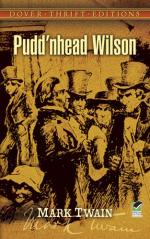The foreman answered:
“TO THE MINUTEST DETAIL!”
Wilson said, solemnly:
“The murderer of your friend and mine—York Driscoll of the generous hand and the kindly spirit—sits in among you. Valet de Chambre, Negro and slave—falsely called Thomas a Becket Driscoll—make upon the window the fingerprints that will hang you!”
Tom turned his ashen face imploring toward the speaker, made some impotent movements with his white lips, then slid limp and lifeless to the floor.
Wilson broke the awed silence with the words:
“There is no need. He has confessed.”
Roxy flung herself upon her knees, covered her face with her hands, and out through her sobs the words struggled:
“De Lord have mercy on me, po’ misasble sinner dat I is!”
The clock struck twelve.
The court rose; the new prisoner, handcuffed, was removed.
CONCLUSION
It is often the case
that the man who can’t tell a lie
thinks he is the best
judge of one. —Pudd’nhead Wilson’s
Calendar
OCTOBER 12, THE DISCOVERY.
It was wonderful to find
America, but it would
have been more wonderful to miss it.
—Pudd’nhead
Wilson’s Calendar
The town sat up all night to discuss the amazing events of the day and swap guesses as to when Tom’s trial would begin. Troop after troop of citizens came to serenade Wilson, and require a speech, and shout themselves hoarse over every sentence that fell from his lips—for all his sentences were golden, now, all were marvelous. His long fight against hard luck and prejudice was ended; he was a made man for good. And as each of these roaring gangs of enthusiasts marched away, some remorseful member of it was quite sure to raise his voice and say:
“And this is the man the likes of us have called a pudd’nhead for more than twenty years. He has resigned from that position, friends.”
“Yes, but it isn’t vacant—we’re elected.”
The twins were heroes of romance, now, and with rehabilitated reputations. But they were weary of Western adventure, and straightway retired to Europe.
Roxy’s heart was broken. The young fellow upon whom she had inflicted twenty-three years of slavery continued the false heir’s pension of thirty-five dollars a month to her, but her hurts were too deep for money to heal; the spirit in her eye was quenched, her martial bearing departed with it, and the voice of her laughter ceased in the land. In her church and its affairs she found her only solace.




